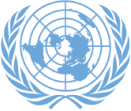Statement by H.E. Mr. Rudolph M. Ten-Pow, Permanent Representative of the Republic of Guyana
at the Permanent Mission of the Republic of Kazakhstan to the United Nations
Excellencies, dear colleagues, good afternoon.
I'd like first all to thank Ambassador Umarov for his commendable initiative in convening this working lunch on the role of science, technology and innovation in the modernization of the Islamic world and in promoting development in general. It is a subject about which Ambassador Umarov is passionate and passion is what is needed to drive this process and bring about needed changes.
I welcome the opportunity to be part of today's panel. When one thinks of the Islamic world, Guyana and the region of Latin America and the Caribbean do not readily come to mind. And so I'm grateful for the opportunity to contribute the perspectives of the small island developing States of the Caribbean and of Guyana in particular on this subject that is of such vital importance to our development prospects.
There are at least three prisms through which we can look at science, technology and innovation. First, as an opportunity to engage in meaningful South-South cooperation. Second, recognition of the synergies between the Astana Declaration and Agenda 2016 of the OIC and the broader 2030 Sustainable Development Agenda to which all members of the OIC have also subscribed. And third, the potential that implementation of the 2026 Agenda has to change the image of the OIC which all too often is perceived in terms of conflict.
The member States of the OIC are a diverse group at different levels of economic development and which have different resource bases and different strengths and weaknesses, including in the fields of science, technology and innovation. This presents us with opportunities for meaningful South-South cooperation. The Astana Declaration calls on OIC member States, for example, to actively promote programs in the field of agriculture and food security. My country Guyana is still relatively undeveloped and lacking in infrastructure and capital. But it is blessed with vast tracts of arable land and abundant supplies of fresh water. Surely, this presents opportunities for collaboration with those OIC member States that lack water and land suitable for agriculture but which have the capital and in some cases the expertise so that the resulting projects are a win-win and beneficial to both parties. You are no doubt aware of the recent offshore oil discoveries in Guyana, which again presents opportunities for collaboration with established OIC producers in our emerging oil and gas sector, particularly in the areas of training and the sharing of best practices.
Many of the priorities and targets set out in the OIC's Agenda 2026 mirror the Sustainable Development Goals and targets in the UN's 2030 Agenda. Wherever possible, we should integrate these parallel efforts and take advantage of the structural and institutional resources of the United Nations as we pursue our common objectives. In some instances, the United Nations and its various agencies have the acquired knowledge and expertise that may not be available within the OIC.
And, lastly, a focus on science, technology and innovation will help change the prevailing image of the OIC community which, regrettably, is all too often characterized by conflict. For many developing OIC member States, science, technology and innovation is one of the keys to development offering as it does opportunities to leapfrog many of the intermediate technologies under the old or traditional development paradigm. This is particularly true in the area of information and communication technologies, including internet connectivity and bridging the digital divide. We have only to look around us to see how the dizzying pace of technological advancement is reshaping our world in fundamental ways with the convergence of three developments: the compilation of vast amounts of data of every conceivable kind, the progress being made in the development of artificial intelligence, and the cheap availability of massive computing power. We are presently seeking, and rightly, so to prioritize science, technology and innovation within the OIC. As we gain experience and build up a record of accomplishments, however, we should share these with the wider global community, thus further contributing to changing the perception and image of the OIC in the global community.
I am conscious of the limited time we have left, so let me conclude by flagging two of the many valuable recommendations contained in the Astana Declaration. The first is the recognition that the eradication of extreme poverty from our society includes poverty of the mind. Education is a vital requirement to survive in a knowledge-based economy and society. And we are all poorer when our societies fail to unlock the potential for creativity and innovation that exists in every single human being, given the right opportunities. And, secondly, the Declaration calls upon all member States to develop a joint policy framework to facilitate the movement and employment of professionals. This pooling of knowledge and experiences and cross-fertilization of perspectives in the end enriches all of us within the community of OIC members.
Thank you all for your attention and I look forward to future opportunities to exchange views and share perspectives on how we can move forward in the implementation of the lofty goals set out in the Astana Declaration and Agenda 2026.
I thank you.


